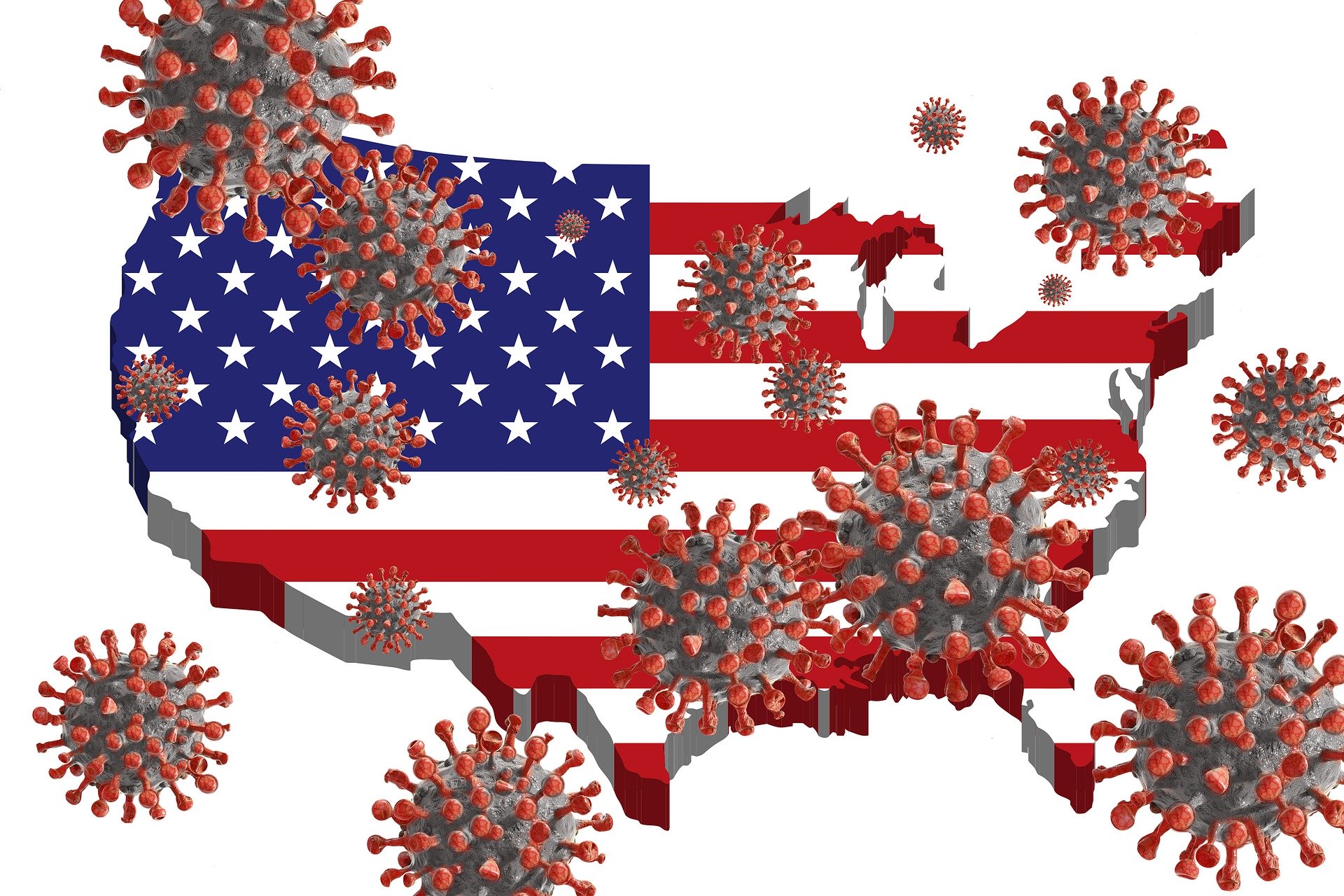The first reaction of a drug trafficker to such shortages is not to find lawful employment. It is to raise prices, as well as doing whatever it takes to corner the market of available fentanyl and methamphetamine precursors, with violence if necessary.
Coronavirus disease 2019 or COVID-19 is affecting every aspect of our lives, not least law enforcement and the courts.
The disease spreads when people are in close contact, roughly less than six feet apart. To limit the number of people infected, most Americans are staying home, voluntarily or otherwise, to avoid spreading or catching the disease.
Some can still do their work from home. Even medical doctors and psychologists are resorting to tele-health – remote visits via Skype or Zoom – for some initial consultations.
Others have jobs that can’t be performed from home and are considered nonessential, so they just stay home. This includes some jobs for which there are few customers in the time of COVID-19, such as air travel, and closed businesses.
Essential Jobs
The remainder is those who have “essential” jobs that they cannot do from home. They must continue to work and interact with other people because society, and even civilization, might break down without them.
Not all are glamorous. Some are arguably life-saving, but not usually accorded much respect (the postal service, grocery stores), but they do include the police who patrol and respond to crime reports and the court system which judges the crimes.
How COVID-19 Affects Meth and Fentanyl
One particular crime that is also affected by the pandemic is illegal and illicit drug use and trafficking. Some of the most abused drugs—fentanyl, a powerful synthetic opioid, and methamphetamine or meth, a stimulant – come from other countries, especially China, which was the first nation to be hit hard by COVID-19.
Mexican drug cartels receive much of the meth and fentanyl, or the ingredients for their production, from China and sell the finished drugs to the United States and elsewhere. Due to COVID-19 fears, it is much harder to ship those drugs from China, and some of the suppliers from the People’s Republic can’t get them in the first place.

The first reaction of a drug trafficker to such shortages is not to find lawful employment. It is to raise prices, as well as doing whatever it takes to corner the market of available fentanyl and methamphetamine precursors, with violence if necessary.
Likewise, the first reaction of addicts to a shortage or higher prices is not to quit. It is to do anything to get some of that remaining supply, or to switch to something else. (Meth use may be on the rise in part because it is harder to get many opioids such as oxycodone and hydrocodone since the post-crisis crackdown.)
These users may resort to burglary or robbery to obtain enough cash to pay the inflated prices. The result could be more drug crime, more violent drug crime, maybe drug gang war, and more drug addicts who need to be arrested and arraigned in a time of pandemic.
How Shortages of Fentanyl and Meth Affect Police Officers
Any increase in crime caused by these shortages may make police work more difficult and dangerous: interacting with drug dealers or users who do not take great care of their health, are more susceptible to infection in general due to weakened immune systems, and who expose themselves to others with no regard to social distancing.
First responders may face shortages of personal protective equipment (PPE) or the anti-opioid overdose drug naloxone (Narcan). Worse, there is no anti-overdose drug for methamphetamine.
Many of these problems that affect urban areas will, in turn, affect rural areas. Although they are not as densely populated, they are not immune to the problems of drug abuse or COVID-19.
For one thing, rural areas have fewer resources. Even so, when strained, urban areas request or commandeer rural resources, too. Unfortunately, this means very few remain to take care of the rural areas if their crime or infection rate increases, leaving rural areas vulnerable.
For another, rural areas may pick up the slack for the lack of illegal drugs from China and Mexico. While many of the import methods for precursors to fentanyl and meth are cut off, some will get through by sea.
These local traffickers may be more desperate and more willing to use violence, including against the police.
Another risk for law enforcement is that of impersonators. Criminals are posing as government employees or police checking people for COVID-19 but either stealing their personal information or robbing them. In the United Kingdom, drug dealers are wearing stolen National Health Service uniforms to continue trafficking despite the lockdown.
Police have not been exempt from perpetrating scams either. Back in February, before COVID-19 was as prevalent in the U.S., police in several states posted messages on Facebook suggesting that recently purchased meth might be contaminated with coronavirus and users should bring them in for testing at police stations.
Some suggested this was a social media joke by the police. Others say the police were playing to the low-hanging fruit of junkies’ poor judgment to get “poison” off the streets. Or, that it was an object lesson that you shouldn’t believe everything you read on the Internet.
Even the CDC thought this was a bad idea, as did those advocating for harm reduction policies such as safe or supervised injection sites (where drugs are tested for potency and contaminants to prevent overdoses).
Police in Argentina aren’t scamming drug users or dealers, but they are using confiscated drug assets to help fight and treat COVID-19. For example, former drug residences are being used to house and treat COVID-19 patients.
How COVID-19 Affects the Courts
The courts are jammed at the best of times, which is not conducive to social distancing. Suspects are innocent until proven guilty, so exposing them to a possibly lethal coronavirus while they await trial is unacceptable.
According to the National Center for State Courts, to reduce congestion in the courts and limit the spread of COVID-19, many of them are limiting access to the courthouse. Sometimes jury trials are restricted. Extensions are being granted to court deadlines, even to paying fees and fines.
In some cases, whenever possible, in-person proceedings are discouraged or prohibited. Teleconferencing is encouraged or required instead.
Drug Treatment Courts
Many civil libertarians have long advocated using drug treatment courts to send nonviolent drug offenders to some form of rehab instead of prison. People who enter prisons as addicts frequently leave the same way because prisons are ill-equipped to offer drug rehab.
Drugs are available in prison. Even if they were not, abstinence alone does not treat addiction. There are frequently underlying or co-occurring mental health issues associated with drug abuse. If these problems are not addressed, substance abuse may resume as soon as the individual leaves prison.
Worse, because a user’s tolerance for drugs decreases with abstinence, if they resume drug use at the same dosage as before, they are likely to overdose and die. That’s without a pandemic.
How COVID-19 affects Drug Treatment Courts
Unfortunately, drug treatment courts are also restricted, if not suspended, during the pandemic.
Drug offenders in treatment courts require in-person contact, for instance, for drug testing or the administration of medication-assisted treatment such as methadone (usually dispensed daily to prevent abuse).
Because drug users and recent drug users are more vulnerable to infection, even if they are in a functioning drug treatment court program, they are still at higher risk of contracting COVID-19.
Teleconferencing and tele-health (remote medical and psychological treatment) are both necessary, as is instruction on how to stay healthy, including what foods to eat, even during a pandemic.
How COVID-19 Affects Incarceration
Even if drug courts were running normally, some convicted criminals would still be sent to jail or prison, increasing their risk of contracting or spreading COVID-19. Inmates rarely have the luxury of staying six feet apart from one another. One way of reducing the risk would be to incarcerate fewer people or release them earlier.
In New Mexico, to prevent the spread of COVID-19, the governor has already early-released two non-violent drug offenders (among a dozen felons), but they only had 30 days or fewer left on their sentences.
New Mexico’s chief public defender wants the governor to greatly expand the order to include other prisoners who only violated a condition of pardon or parole but committed no new crime.
While COVID-19 causing shortages of these dangerous drugs might be seen by some as good news, it’s not. Prohibition didn’t stop people from drinking alcohol, but it did broaden the category of alcohol-related deaths to include bootleggers’ bullets.
Meth can be made from common chemicals in small labs or from more sophisticated “superlabs”. Fentanyl is harder to make but is so incredibly potent – 50 times stronger than heroin – that dealers use it in place of more expensive opioids or as a cutting agent in cocaine or even meth.
The only way to stop substance abuse, in the long run, is by:
- Reducing the demand, not the supply
- Helping abusers who want to quit get easier access to evidence-based rehab.
- Treating any co-occurring mental health issues (depression, bipolar disorder, schizophrenia).
COVID-19 makes all three harder to do. The police and the courts are busy enough without putting addicts through a hard time.
Sources
- Coronavirus Is Leading to Shortages of Fentanyl And Meth – vice.com/en_us/article/wxek4m/coronavirus-is-leading-to-shortages-of-fentanyl-and-meth
- How the coronavirus outbreak is affecting the US criminal justice system – abcnews.go.com/US/coronavirus-outbreak-changing-us-criminal-justice-system/story?id=69757440
- How COVID-19 is changing law enforcement practices by police and by criminal groups – brookings.edu/blog/order-from-chaos/2020/04/07/how-covid-19-is-changing-law-enforcement-practices-by-police-and-by-criminal-groups/
- Drug dealers are stealing NHS uniforms so they can escape coronavirus lockdown measures – thesun.co.uk/news/11403579/drug-dealers-stealing-nurses-uniforms-coronavirus-lockdown/
- At least two dozen US police departments have spread misinformation linking coronavirus to meth – businessinsider.com/us-police-departments-spread-coronavirus-joke-linking-it-to-meth-2020-2
- City-run supervised injection site to reopen this weekend – nowtoronto.com/news/april-17-coronavirus-updates-toronto-news/
- Argentina Puts Seized Assets to Good Use in Coronavirus Fight – insightcrime.org/news/brief/argentina-assets-coronavirus/
- Criminal Justice System Responses to COVID-19 – ncsl.org/research/civil-and-criminal-justice/criminal-justice-and-covid-19.aspx
- In Practice: Drug Courts in the Time of COVID-19 – courtinnovation.org/publications/drug-courts-covid19
- NM Public Defender’s Office calls for more inmates to be released amid COVID-19 crisis – kob.com/new-mexico-news/nm-public-defenders-office-calls-for-more-inmates-to-be-released-amid-covid-19-crisis/5701571/
- Gov. announces executive order for early release of inmates – kob.com/new-mexico-news/gov-announces-executive-order-for-early-release-of-inmates/5694417/
- Meth Awareness In The News – justice.gov/archive/olp/methawareness/#made


Join the conversation!